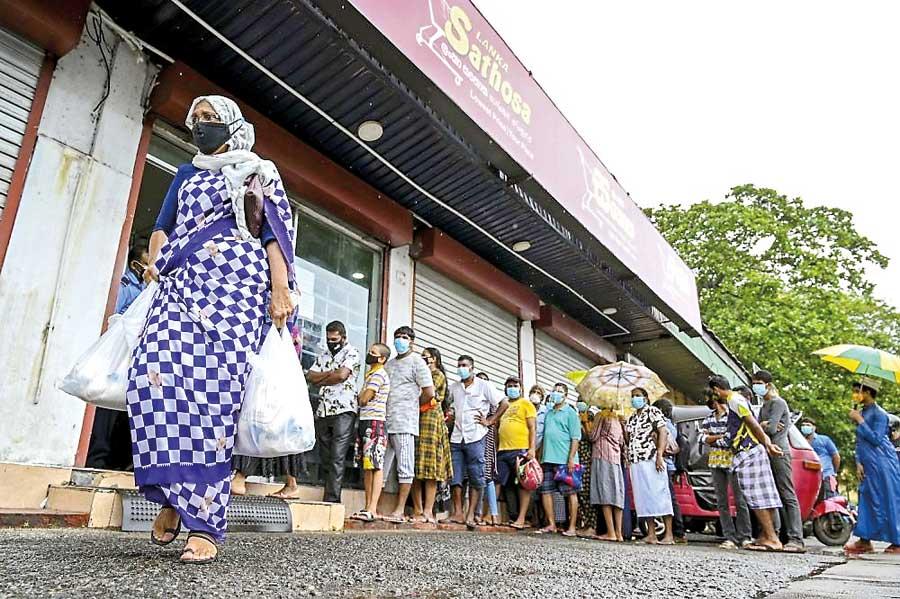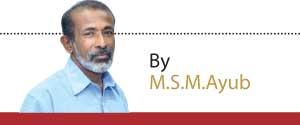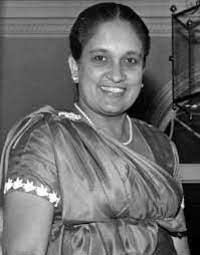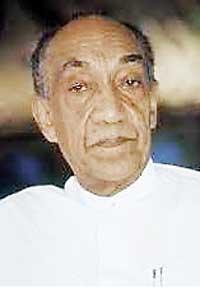28 Jan 2022 - {{hitsCtrl.values.hits}}

What is in store for the Sri Lankans in the near future, given the current gloomy economic crisis? It is vividly clear that the Government is struggling without solutions to any of the problems, faced by the country, especially the draining of the foreign reserves. The Energy Ministry and the Power Ministry have become coolies or day labourers finding their subsistence then and there.
then and there.
They announce every few days how many days they can supply fuel and electricity, leaving people in constant uncertainly of their future. The Ministers do not seem to have a collective effort to solve the issues faced by the people while the officialdom is also attempting to save their skin, by distancing themselves from the critical issues.
The Government is so helpless that the Ministers are wailing before the masses over their woes and ludicrously pointing fingers at each other in public. They are attempting to absolve themselves from their responsibilities while people are suffering from the severe shortage of essential goods such as domestic gas and milk powder amidst looming long hours of power cuts and thereby lives coming to a standstill.
"The laments of Energy and Power Ministers over their inability to ensure a constant supply of power and the chaotic situation in the agricultural sector following the ill-timed ban on chemical fertilizer have instilled fear in the minds of the people over their lives"
 Life has drastically changed compared to that in the 1980 and before with electricity and machines playing a dominant role in the lives of the people even in remote rural villages.
Life has drastically changed compared to that in the 1980 and before with electricity and machines playing a dominant role in the lives of the people even in remote rural villages.
The laments of Energy and Power Ministers over their inability to ensure a constant supply of power and the chaotic situation in the agricultural sector following the ill-timed ban on chemical fertilizer have instilled fear in the minds of the people over their lives.
While those below the age of fifty are confused about what awaits in a few months, as their experience does not help visualize the situation ahead, those above that age limit fear a famine-like situation that prevailed some fifty years ago during the tenure of Prime Minister Sirimavo Bandaranaike might befall them.
The cause for the crises then and now has been the same, a severe foreign exchange crunch. Sri Lanka which had surplus reserves when it gained Independence from the British Raj had exhausted them within two decades mainly due to the failure on the part of the successive Governments to diversify and expand the economy.
The country had then been relying primarily on the export crops, tea, rubber and coconut for foreign exchange. But the rise in the revenue during those two decades was highly disproportionate to the rise in Government expenditure.
Within the first year in office, Mrs Bandaranaike faced the first insurrection of the Janatha Vimukthi Peramuna (JVP) in 1971 and this worsened the situation. The Leftist leaders who had a big say in the affairs of the Government influenced the Government to follow a “Closed Economy” policy, preventing foreign investments.
The upshot of all these was an unprecedented scarcity of essential goods and a sharp rise in prices, especially those of food items. Between late 1971 and early 1973, a period of about one year the prices of some food items rose by tenfold.
"Queues were a common sight due to the severe shortage of food items. Famous among was the bread queue seen in front of bakeries and co-operative outlets in the noon and evenings"
Sri Lankans had been enjoying food subsidies ever since World War II with fluctuation of the number of foods subsidized. The Government under Prime Minister Dudley Senanayake between 1965 and 1970 halved the amount of subsidized rice from two measures to one per person for a week.
Mrs Bandaranaike’s main promise to the electorate at the 1970 General Election was to restore the amount of rice lost by the consumers during the previous administration, even importing from the “moon.” (Handen genalla hari haal seru theka denava).
But the balance of payment situation prevented her from keeping that promise. Instead, she had to further reduce the amount of subsidized rice and provide substitute food items such as wheat flour. The strict import controls pursued by the Government created a severe shortage of food which pushed the people to eat anything that could consider not poisonous.
The situation in rural areas where there are vegetation people even consumed leaves of certain plants which they have never done. Some people found food in the roots of banana trees. The plight of the people in urban and plantation areas was immeasurable.
The plight of the people in urban and plantation areas was immeasurable.
Sugar was a luxury item that was sold at a highly subsidized price of 72 cents a pound whereas the price in the open market was Rs.7.50.
Poor families bought the weekly one pound of subsidized sugar at the co-operative outlets and resold it at Rs.7.50 to use the money to buy other essential goods. Tea was in most cases partaken with other substitutes such as jaggery, which in fact was made abundantly mixing with wheat flour. Some families did not feel ashamed to serve relatives with tea with a piece of coconut kernel or lunch with boiled manioc, sweet potato or even jakfruit.
Queues were a common sight due to the severe shortage of food items. Famous among was the bread queue seen in front of bakeries and co-operative outlets in the noon and evenings.
The rice shortage was such that the Government banned serving rice in eateries on Tuesdays and Fridays. People ridiculed the decision by saying the two days were selected based on the Sinhala initials of the Prime Minister and her son Anura (Sirima - Sikurada and Anura - Angaharuwada)
The Government banned the transportation of rice and chillies across the district borders to prevent hoarding of those items by unscrupulous elements.
Accordingly, one has to obtain permission to carry more than two pounds of these items across district borders from the Assistant Government Agent (AGA) whose designation has now been changed to Divisional Secretary.
Barricades manned by Police personnel had been put up at every point where main roads crossed the district borders for this purpose. People called them Haal polu and miris polu.
A huge campaign was carried out to persuade the people to grow more food under the theme of “Grow more food.” Although people who or whose parents supported Mrs Bandaranaike’s Government still argue that country would have achieved self-sufficiency had her agricultural policy was continued her strategy, it did not yield the expected results as most of the arable lands had already been cultivated. Despite the Government having pressed the people to cultivate, no new irrigation facilities were provided to the farmers in the dry zone. Her strategy to provide lands to the landless hill country farmers by alienating a section of lands from the tea plantations in Nuwara Eliya District could not offset the loss incurred by the tea industry, a major forex earner.
"The Government under President J.R. Jayewardene did away with the closed economic policies that were thus far followed and floated the rupee instead of an artificial rate against the dollar"
The attempt by the farmers in the hill country to expand their lands in order to cultivate more resulted in their traditional methods to prevent soil erosion being ignored.
However, the call by the Government to grow more food provided the northern farmers with a very good market in the southern areas of the country and their gratitude was evident at the 1982 Presidential election where the Sri Lanka Freedom Party (SLFP) candidate Hector Kobbekaduwa drew a sizable number of votes from the North.
The famine-like situation during Mrs Bandaranaike’s tenure was a godsend to the United National Party (UNP) which secured an unprecedented five-sixths of seats (140 out of 168 seats) in Parliament at the 1977 General Election. The SLFP was reduced to just eight seats a historic defeat in the Sri Lankan election history.
The Government under President J.R. Jayewardene did away with the closed economic policies that were thus far followed and floated the rupee instead of an artificial rate against the dollar.
And he somewhat diversified the economy by introducing the open economy and Free Trade Zones, notwithstanding the ill-effects of the open economy such as high profile corruption and increasing decay in morality in the society.
He also expanded the agricultural sector by the construction of several large-scale reservoirs along the Mahaweli Ganga, the longest river in the country with foreign aid. Both these actions facilitated the inflow of foreign exchange. However, the economy started to stagnate again during his second term starting from 1982.
Even students of economics theoretically know the remedy for the current crisis. They are being taught at schools and universities that a country can strengthen its foreign reserves only by diversifying the economy and increasing the local production of essential goods and import substitutes.
Yet, those students, when they take up high positions in politics and bureaucracy, do not take the risk mainly of thinking about the next generation rather than the next election.
28 Nov 2024 53 minute ago
28 Nov 2024 2 hours ago
28 Nov 2024 2 hours ago
28 Nov 2024 3 hours ago
28 Nov 2024 5 hours ago